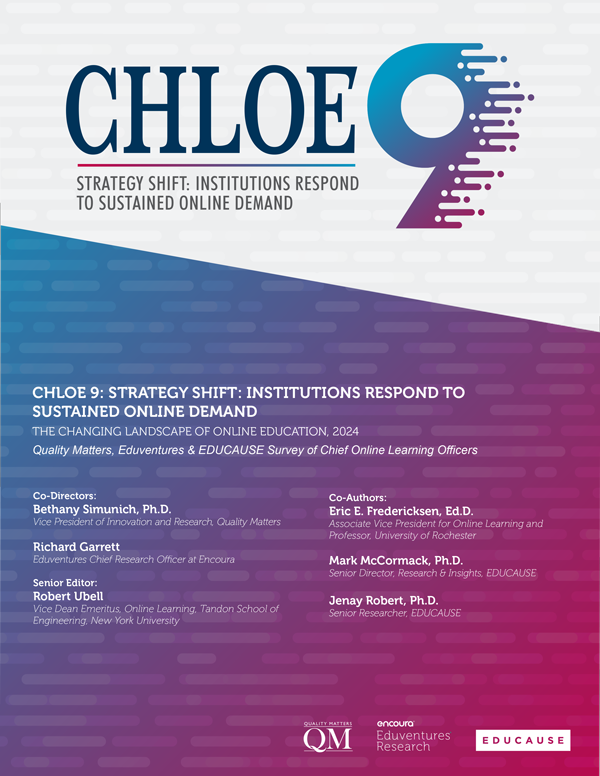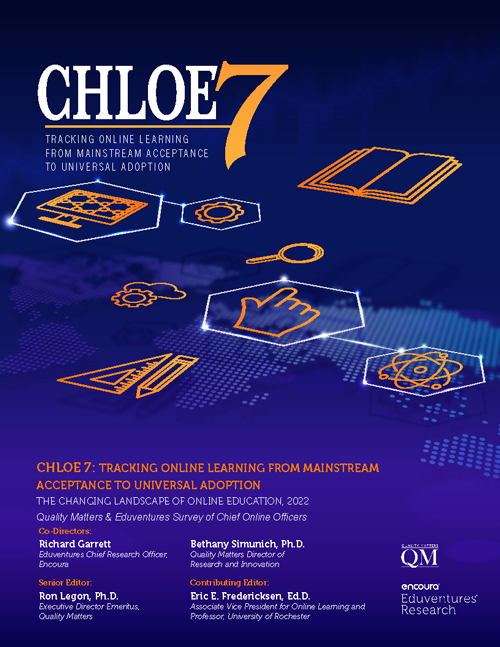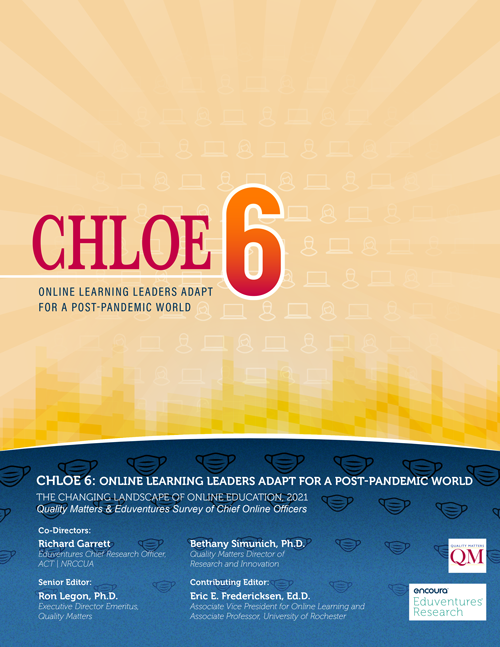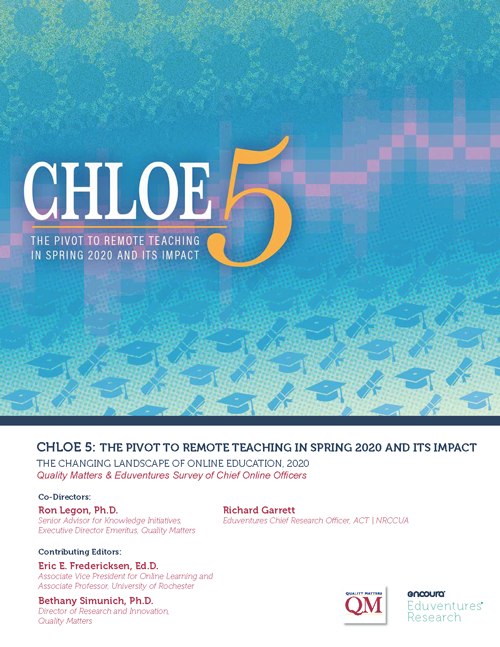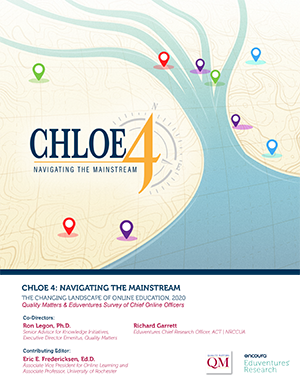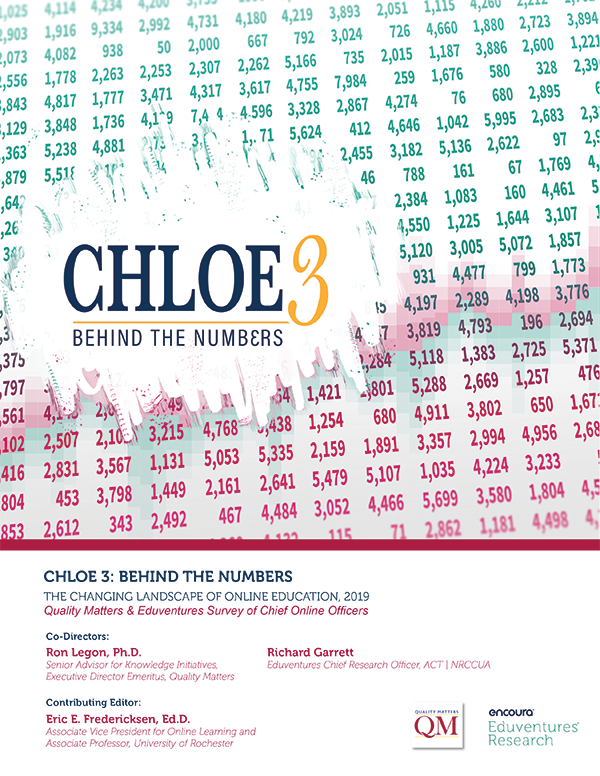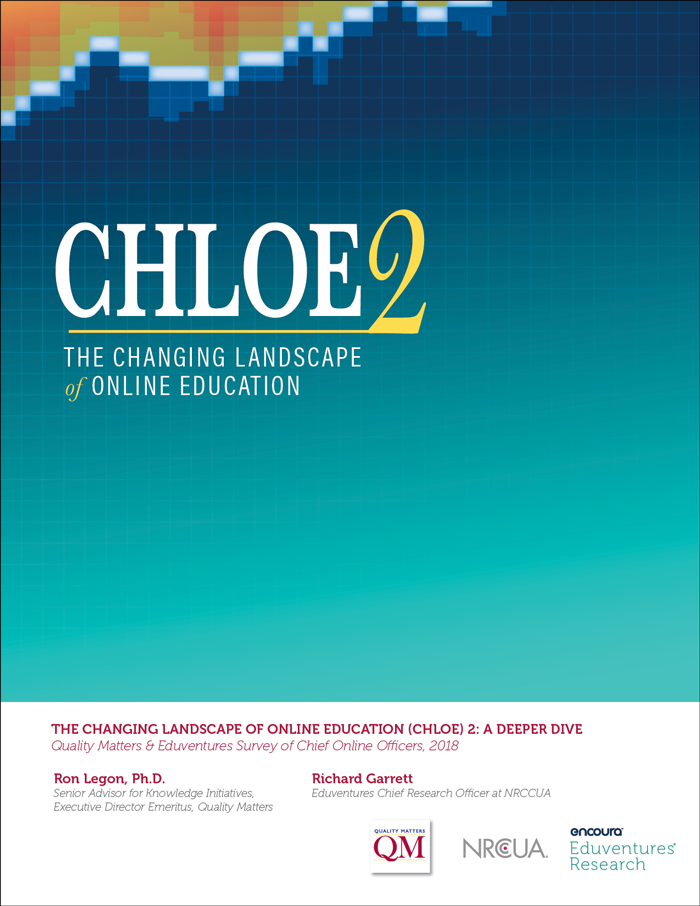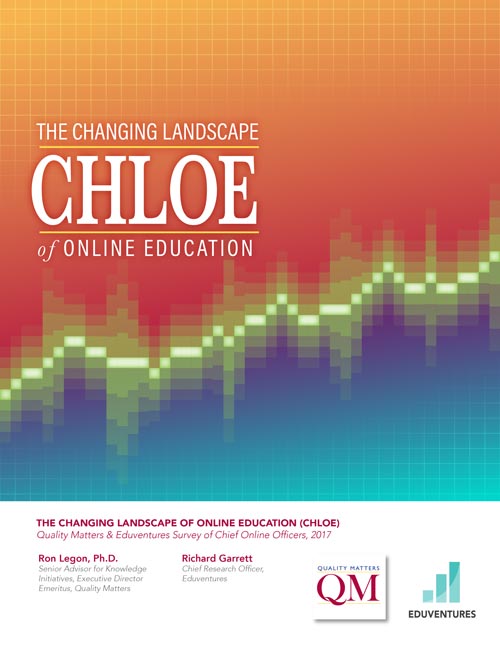The Changing Landscape of Online Education (CHLOE)
Bay View Analytics is pleased to work with Eduventures Research, Quality Matters and EDUCAUSE on the CHLOE project. This unique and important project looks at the structure and organization of postsecondary online education in the U.S. using the insight and perspective of the senior online officer at each participating institution in the belief that this individual has a unique vantage point from which to assess online learning at their institution.Begun in 2016, Quality Matters and Eduventures Research first partnered to fill the knowledge gap about how online learning is being managed at post-secondary institutions in the United States. Since then CHLOE surveys have produced in-depth yearly reports, including a special report on the pivot to remote teaching in 2020.
Are you an Online Learning Leader?
If so, please join your peers so your opinions can be included in CHLOE 9 which will focus on the priority of online learning in institutional strategy, the role online learning plays in institutions' identities, and the different populations institutions aim to serve.
Sign up to participate in CHLOE Surveys
The Reports
CHLOE 9: Strategy Shift: Institutions Respond to Sustained Online Demand
The ninth installment of the Changing Landscape of Online Education (CHLOE) report, produced by Quality MattersTM , Eduventures® and Educause — shows the majority of survey participants report both learner demand for online learning surging and institutional strategic priorities shifting to meet this demand, as well as the adaptation to the new presence of AI tools in the academic environment. Notable findings from the 53-page report include:- Priorities for Online Learning: Institutions are increasingly prioritizing the development of online versions of both on-campus courses (69%) and on-campus degrees (65%) in order to meet demand.
- Tuition and Institutional Revenue: Most chief online officers (COLOs) surveyed reported that their institutions charge the same tuition for online learning as they do for traditional face-to-face learning.
- AI in Higher Education: Only 35% of COLOs reported having AI-related policies; 40% reported that policies and guidelines related to AI were topics under discussion. 34% of COLOs reported that students are encouraged to engineer AI prompts in their classes, and 32% of COLOs say that AI as a topic is taught to students.
- Third-Party Servicers: In early 2023, the U.S. Department of Education announced new accountability measures for Third-Party Servicers. In CHLOE 9, about a quarter of COLOs reported that their institution currently works with at least one OPM, an increase from the 18% who said the same in CHLOE 7 (2022), suggesting that OPM adoption by institutions invested in online learning is still growing.
- Regular and Substantive Interaction: In order for online courses to qualify for federal student aid, the U.S. Department of Education requires Regular and Substantive Interaction (RSI) to occur. Only a small minority (7%) of schools report not having (or considering) RSI policies or guidelines, with public institutions more likely to have them than private institutions.
CHLOE 8: Student Demand Moves Higher Ed Toward a Multi-Modal Future
Student demand for online and hybrid learning continues to grow, and institutions are working hard to find their footing in this post-pandemic environment. The deeper story is that institutions are reexamining their identities and priorities in light of this increased multi-modal demand. Major takeaways from the eighth survey of U.S. chief online officers on how their two- and four-year schools are managing online learning include:- A majority of respondents report stagnant or declining enrollment among traditional undergraduates in face-to-face programs, and an even greater percentage say that the number of adult undergraduates and graduate students in these programs is declining.
- Chief online officers report strong growth for fully online programs (36%) or hybrid programs (20%), and a greater percentage say adult undergraduate and graduate online and hybrid programs are growing.
- Approximately half the respondents confirm that their present strategic plans and resource allocations support a greater emphasis on online learning and multi-modal study. An additional 36% indicate their institutions are reconsidering strategic priorities in light of student demand.
Download the CHLOE 8 report (pdf)
CHLOE 7: Tracking Online Learning From Mainstream Acceptance to Universal Adoption
In the next few years, online learning will become a part of nearly every higher ed student’s experience.That’s one takeaway from the CHLOE 7 report, a joint project of Quality MattersTM and Eduventures® that offers an overview of the online learning landscape at higher education institutions. The report draws on survey responses from chief online officers at two- and four-year colleges and universities, who are uniquely situated to assess the current state of online education. Significant takeaways from the in-depth report include:- A large majority of respondents predict that by 2025 most higher education learner experiences will include online learning.
- Institutions can and should adjust their strategies and allocate more resources to online learning in response to student needs.
- While quality assurance standards for online courses are in place, review processes for ensuring standards are met are lagging.
Download the CHLOE 7 report (pdf)
CHLOE 6: Online Learning Leaders Adapt for a Post-Pandemic World
The COVID pandemic constituted a stress test on how online learning could respond to an externally driven emergency requiring its rapid expansion and how such an experience, encompassing the entirety of higher education, might change its scope, image and future direction. CHLOE 6 establishes that the pivot to remote learning increased the reach and accelerated the adoption of online learning, and increased the influence of chief online officers. Key CHLOE 6 Survey findings:- All sectors of higher education invested in ed tech in 2020 and 2021, amounting to the biggest investment jump ever. This included largely in-person schools that had not previously made significant investments in online learning-related technologies.
- Two-thirds of surveyed institutions relied on their chief online officer to coordinate their institution’s response to the COVID-19 pandemic, including course conversion, faculty training, student preparedness, technology capability, and quality assurance.
- When asked about future online undergraduate enrollment, only 13% of Chief Online Officers (COOs) expected the moderate growth seen in pre-pandemic years, while 77% predicted some or major acceleration in this trend.
Survey description: CHLOE 6: Online Learning Leaders Adapt for a Post-Pandemic World
Download the CHLOE 6 report (pdf)
CHLOE 5: The Pivot to Remote Teaching in Spring 2020 and Its Impact
CHLOE 5 is a departure from the previous four surveys and reports in its focus on a single issue — the impact of higher education's response to the COVID-19 pandemic and the impact it is having on the short- and long-term prospects of online learning. In CHLOE 5, Chief Online Officers:- Identify the key challenges their institutions had to overcome during their pivot to remote instruction in spring 2020
- Acknowledge the specific challenges involved in the pivot, while concluding the pivot was largely successful from the institutional, student, and faculty perspectives
- Specify their priorities for quality improvement to remote instruction to get closer to true online learning should expanded online learning continue into fall 2020 and beyond
Survey description: CHLOE 5: The Pivot to Remote Teaching in Spring 2020 and Its Impact
Download the CHLOE 5 report (pdf)
CHLOE 4: Navigating the Mainstream
The number of participants in CHLOE continued to grow in this fourth year, up 31% from participation in CHLOE 3. Respondents to CHLOE 4 included 20 of the 60 Flagship schools in the U.S. (33%). Some surprising contrasts with other sectors emerge from a first look at Flagship institutions.CHLOE 4 continued coverage from the earlier CHLOE surveys and found, for example, that use of OPMs doubled from 12% to 24% between 2017 and 2019. It confirmed findings from the earlier reports, such as the finding that “enterprise” institutions — those that already have the largest online enrollments at more than 7,500 fully and partly online students — have the most aggressive plans for program expansion and that the course development process is largely internal, with heavy dependence on faculty and less consistent involvement of instructional designers.
CHLOE 4 dug deeper with more open-ended questions about issues such as long-term institutional goals and the relationships of chief online officers with other senior administrators. The top three goals for online education over the coming five years listed by chief online officers were improving quality, increasing enrollment and adding courses and programs.
Survey description: CHLOE 4: Navigating the Mainstream
Download the CHLOE 4 report (pdf)
CHLOE 3 Report: Behind the Numbers
CHLOE 3 broke new ground in identifying a number of different institutional approaches to online learning, as crystalized in the descriptions of five models (Enterprise schools, Regional Public and Regional Private 4-Year schools, 4-Year schools with Low Online Enrollment, and Community Colleges). Major themes in CHLOE 3 include a more complete picture of the growth, prevalence, and scope of the Chief Online Officer position; the emergence of online committees and councils as a component of institutional shared governance; associations between online course structure, student engagement and outcomes; and the widespread neglect of coordinated blended learning.Survey description: CHLOE 3: Behind the Numbers
Download the CHLOE 3 report (pdf)
CHLOE 2 Report: A Deeper Dive
CHLOE 2 (2017) saw participation increase by 75% over the CHLOE 1 (2016) Survey. The larger sample confirmed major findings of the first survey on such mainstream issues as: widespread perceptions that online learning is a revenue generator, increasing competition, and reliance on institutional budgeting processes to meet the needs of online learning. This report delves into more detail than that of the CHLOE 1 Report with a focus on the motives behind the choices made by leaders of online programs.Survey description: CHLOE 2: A Deeper Dive
Download the CHLOE 2 report (pdf)
CHLOE 1: The Changing Landscape of Online Education
The 2017 CHLOE Report, “The Changing Landscape of Online Education,” establishes baseline information on important trends in the management of online learning, current and emerging tools and methods in the field, regulation and accreditation challenges, and quality assurance activities. The CHLOE Survey, upon which the report is based, sets the stage for wider discussion of these issues.Survey description: CHLOE 1: The Changing Landscape of Online Education
Download the CHLOE 1 report (pdf)
Recent Publications
Open Educational Resources
- Approaching a New Normal? Educational Resources in U.S. Higher Education, 2024
- Conflicted Digital Adoption: Educational Resources in U.S. K-12 Education, 2024
- Research Brief: Digital and OER Textbook Adoption
- Research Brief: Faculty Satisfaction with Course Materials varies by Publisher
Course Material Affordability
Digital Learning Pulse Surveys
- Infographic: 2023-2024 Digital Learning Pulse Survey
- The Digital Transformation of the Community College
- Planning for a Smaller Future: Dealing with Declining Enrollments
STEM
- Teaching Online: STEM Education in the Time of COVID
- What Makes a STEM Student
- Perceptions of the Future of STEM Education
Distance Education
- Digital Faculty: Faculty Social Media Use and Communications
- Infographic: Digital Faculty
- Grade Increase: Tracking Distance Education in the United States
Follow us on
Privacy
All survey respondents are provided complete anonymity. No personally identifiable information is released. Full privacy policy.
